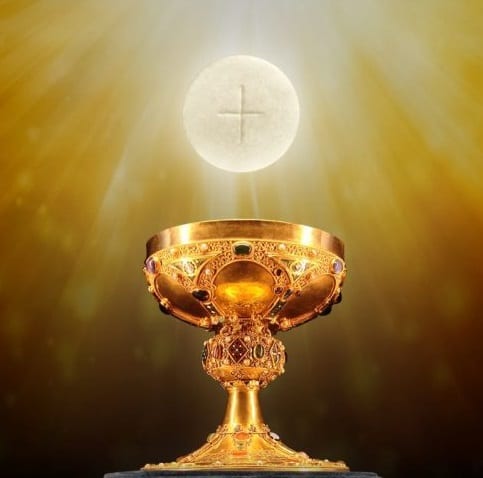
The Eucharist has always been celebrated by the Church since Jesus instituted it at the Last Supper. There are some things that never changed: the matter of bread and wine, the form of the celebration has always included the sharing of the word and the memorial of the Last Supper, and the firm conviction of true believers that the Eucharist is truly the Body and Blood of Christ.
Many Christians do not believe in the real presence of our Lord in the Eucharist; they say that the Eucharist is only a symbol and that Jesus was speaking figuratively in His Bread of Life discourse (John 6:22-59). Some even try to persuade others to give up believing in the real presence, claiming that it is an invention of the Roman Catholic Church in the 12th century. That claim makes no sense because the Eastern Orthodox Church also believes in the real presence. Still others even claim that the early Church fathers did not believe in the real presence. Let’s take a look at what two of them have said.
St. Justin Martyr, a 2nd century philosopher and apologist said this about the Eucharist: “For not as common bread and common drink do we receive these; but in like manner as Jesus Christ our Savior, having been made flesh by the Word of God, had both flesh and blood for our salvation, so likewise have we been taught that the food which is blessed by the prayer of His word, and from which our blood and flesh are nourished, is the flesh and blood of that Jesus who was made flesh.” (First Apology, 66)
St. Irenaeus was the second bishop of Lyons in the 2nd century. Irenaeus had many writings, but his most important work is what is called “Against Heresies.” At the time of Irenaeus, there were already many circulating heresies in the early Church, particularly Gnosticism. The purpose of Irenaeus’ work was to refute the teachings of various Gnostic groups.
In his work “Against Heresies,” Irenaeus wrote about the Eucharist as nourishment for Christians and as Christ’s promise for eternal life. Here is the text:
He (Christ) declared that the chalice, which comes from his creation, was his blood, and he makes it the nourishment of our blood. He affirmed that the bread, which comes from his creation, was his body, and he makes it the nourishment of our body. When the chalice we mix and the bread we bake receive the word of God, the eucharistic elements become the body and blood of Christ, by which our bodies live and grow. How then can it be said that flesh belonging to the Lord’s own body and nourished by his body and blood is incapable of receiving God’s gift of eternal life? (Against Heresies, Book V,2,3)
Jesus said to the Jews who said ‘How can this man give us his flesh to eat?’: “Amen, amen, I say to you, unless you eat the flesh of the Son of Man and drink his blood, you do not have life within you. Whoever eats my flesh and drinks my blood has eternal life, and I will raise him on the last day.” (John 6:53-54) The only viable interpretation is that the flesh and blood of which Jesus talked about is His Body and Blood in the Eucharist.